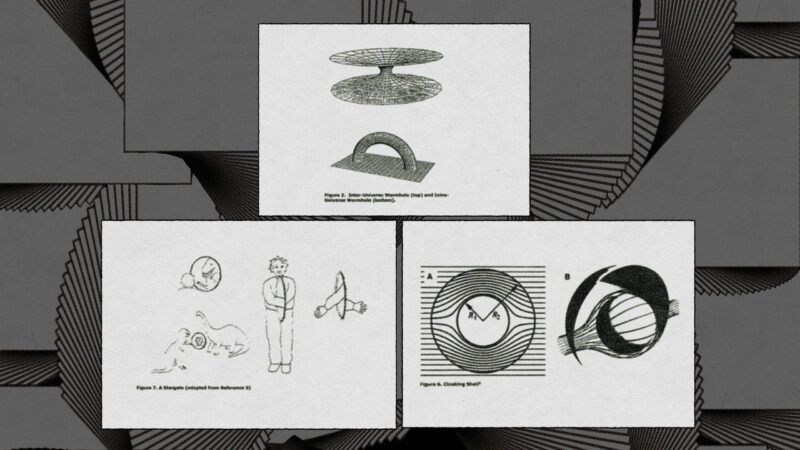The Feds Spent $22 Million Researching Invisibility Cloaks, UFOs, and a Tunnel Through the Moon
However wonderful it is to imagine a world in which these things are possible, the government shouldn’t be shelling out millions to entertain speculation.

Documents acquired by Vice via a public records request have revealed details about a secretive government program that was researching highly speculative and often outlandish theories and technologies, including the development of invisibility cloaks and the feasibility of building a tunnel through the moon using nuclear explosions.
Those documents (which are available here) reveal insights into the research conducted by the Advanced Aerospace Weapons System Application Program (AAWSAP), a program that often overlapped with the Advanced Aerospace Threat Identification Program (AATIP). Both were funded by the Defense Intelligence Agency (DIA), a division of the Department of Defense (DOD). AAWSAP and AATIP research focused on the potential use of far-term technologies in defense and military settings. While AATIP "was the name of the overall program," AAWSAP "was the name of the contract that DIA awarded for the production of technical reports," according to a DIA spokesperson.
The AATIP made waves in 2020 for its study of UFO-related phenomena. (It formally disbanded in 2012, but multiple reports indicate that it has lived on in some form). Though the existence of the AAWSAP and the AATIP has been known for years, the newly-publicized details of their research are proving as outlandish as the UFO fodder of yore. "None of these technologies ever seem to have gotten remotely close to being a reality, as far as we know," says Vice. Rather, the aspects of this program that are now seeing the light of day are reports, assessments, and memos that reveal truly bizarre research carried out using government dollars, out of public view.
One document, entitled "Invisibility Cloaking: Theory and Experiments," explores "camouflage, transparency, and cloaking" and "honestly discusses technological challenges to making a practical invisibility cloak," per a DIA memo. The report's chosen illustrations of invisibility-related concepts include H.G. Wells' novel The Invisible Man, jellyfish, and Invisible Woman, a character in the Fantastic Four comic series. "Whether invisibility in the visible range of the spectrum will become a reality is not entirely clear yet," the document concludes.
Another report discusses negative mass propulsion and the possibility of harnessing wells of negative mass for space travel. "It just happens that the center of the moon is a potential well," reads the document summary. "Making a tunnel through the moon, provided there is a good supply of negative mass, could revolutionize interstellar space flight." There is a lengthy discussion of the processes "required to shatter the rocks to make a tunnel from the center of the moon…to its surface," suggesting "nuclear explosions."
The 2008 Defense Supplemental Appropriation Act included $10 million for the AATIP and the 2010 Defense Appropriations Act allotted $12 million, amounting to $22 million over five years. It is unclear how much of that money went toward researching UFOs and how much went toward invisibility cloaks, because how the money was used has been shrouded in secrecy.
One of the key figures advocating for that secrecy was former Sen. Harry Reid (D–Nev.), who was behind the research program's creation. Reid pushed for high levels of classification, writing that "the continued study of these subjects will likely lead to technology advancements that in the immediate near-term will require extraordinary protection." In a 2009 letter to then–Deputy Secretary of Defense William Lynn, Reid argued that the insights and innovations resulting from the research would "allow the U.S. to maintain its preeminence as a world leader."
As questions around research priorities have mounted, so have concerns surrounding financial transparency. Per Vice, "AATIP and AAWSAP weren't doing much of that research in-house." Rather, they relied on contract research carried out by Bigelow Aerospace Advanced Studies. Robert Bigelow, the owner of that company, was a friend of Reid's—Vice reports that Bigelow "lobbied for the creation of the AATIP program" and his organization was the sole bidder for the AAWSAP contract. Bigelow has also financed investigations of alien abduction claims and offered a $1 million prize for anyone who can provide evidence of life after death.
Steven Aftergood, former director of the Federation of American Scientists' Project on Government Secrecy, raised a red flag about the program in a 2020 Popular Mechanics interview. "The whole contracting process for this program was irregular from start to finish," he said. The AAWSAP contract "sounds like it was a good deal for the contractor. But it would be hard to argue that either the military or the public got their money's worth."


Show Comments (76)